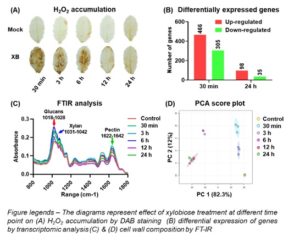Cell wal l-derived oligosaccharides are often generated during pathogen attacks and plant development, and plants sense them as a danger signal and trigger the immune response. However, how these oligosaccharide signals can reinforce or remodel the cell wall by maintaining its integrity which is not explored in detail. Therefore, this study investigated the role of xylan-derived xylo-oligosaccharides (XOS) on plant immune responses and cell wall remodeling. To understand this, Arabidopsis rosette leaves were transiently treated with the smallest XOS, i.e., xylobiose (XB), and observed various responses by studying transcriptome, hallmarks of pathogen-triggered immunity (PTI), and cell wall analysis. Transcriptomics analysis revealed that more genes were differentially regulated after 30 min compared to 24 h of XB-treated leaves, which correlated with the response of PTI hallmarks. One of the reasons for this faded response at a later time is the induction of beta-xylosidase, which can hydrolyze XB and weaken DAMP activity. More importantly, XB treatment affects cell wall composition at different time points till 24 h, suggesting that the induction of XB at an early point is enough to alter cell wall composition. Overall, the study provides insights into the impact of XOS on plant immunity and cell wall dynamics and opens a plethora of opportunities to study the role of XOS in different plant processes.
l-derived oligosaccharides are often generated during pathogen attacks and plant development, and plants sense them as a danger signal and trigger the immune response. However, how these oligosaccharide signals can reinforce or remodel the cell wall by maintaining its integrity which is not explored in detail. Therefore, this study investigated the role of xylan-derived xylo-oligosaccharides (XOS) on plant immune responses and cell wall remodeling. To understand this, Arabidopsis rosette leaves were transiently treated with the smallest XOS, i.e., xylobiose (XB), and observed various responses by studying transcriptome, hallmarks of pathogen-triggered immunity (PTI), and cell wall analysis. Transcriptomics analysis revealed that more genes were differentially regulated after 30 min compared to 24 h of XB-treated leaves, which correlated with the response of PTI hallmarks. One of the reasons for this faded response at a later time is the induction of beta-xylosidase, which can hydrolyze XB and weaken DAMP activity. More importantly, XB treatment affects cell wall composition at different time points till 24 h, suggesting that the induction of XB at an early point is enough to alter cell wall composition. Overall, the study provides insights into the impact of XOS on plant immunity and cell wall dynamics and opens a plethora of opportunities to study the role of XOS in different plant processes.
Dewangan et al., “Xylobiose treatment triggers a defense-related response and alters cell wall composition.” Plant Molecular Biology – Special issue Dynamics and Mechanics of Plant Cell Walls. Volume 113, pages 383–400, (2023).

